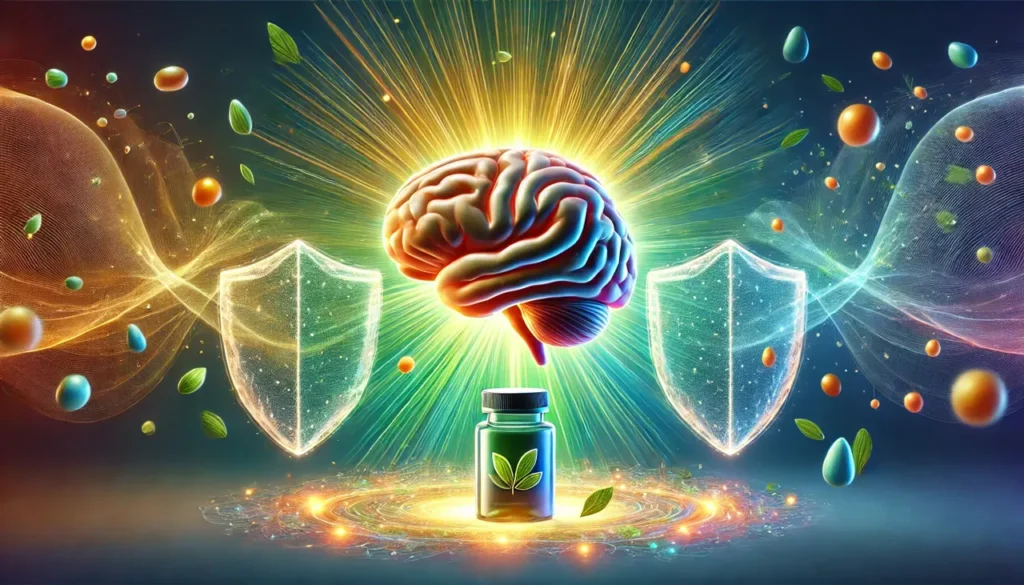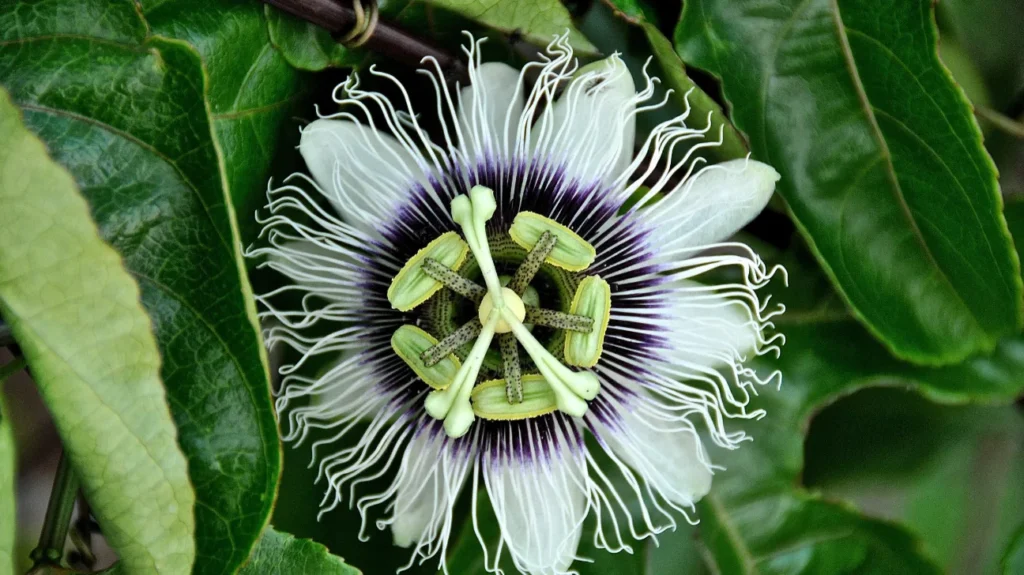Passion flower (Passiflora incarnata) is a perennial plant that has been traditionally used for its calming and sedative properties. Native to North and South America, it has been employed in herbal medicine to treat anxiety, insomnia, and gastrointestinal disorders. Recently, passion flower has gained attention for its potential nootropic effects, with research suggesting that it may enhance cognitive function, improve mood, and protect the brain from stress-induced damage. This article explores the science behind passion flower’s nootropic potential, including its chemistry, mechanisms of action, dosage, side effects, interactions, and safety considerations.
You May Also Like:
Should You Try CBD for Focus? Here Are the Facts.
Reishi Spores: Powerful Ancient Medicine For The 21st Century
Sources of Passion Flower
Passion flower is native to warm and temperate regions, primarily found in the southeastern United States, Central America, and South America. It is known for its unique, intricate flowers, and its leaves and stems are most commonly used in herbal preparations. Passion flower is available in various forms, including teas, tinctures, capsules, and extracts.
The plant’s medicinal properties are primarily derived from its:
- Leaves and stems: These parts are typically harvested and dried for use in supplements and teas.
- Extracts: Concentrated passion flower extracts contain higher levels of active compounds, which are thought to provide nootropic and anxiolytic benefits.
While traditionally used for its calming effects, emerging research suggests that passion flower may also offer cognitive benefits, particularly in the areas of stress management, mood regulation, and neuroprotection.

Chemistry of Passion Flower
The potential nootropic benefits of passion flower are attributed to several active compounds that interact with the brain’s neurotransmitter systems and antioxidant pathways. The most notable chemical constituents of passion flower include:
- Flavonoids: Passion flower contains a rich concentration of flavonoids, including apigenin, luteolin, quercetin, and kaempferol. Flavonoids are known for their antioxidant and anti-inflammatory properties, which may protect brain cells from oxidative stress and inflammation.
- GABA (gamma-aminobutyric acid): One of the key effects of passion flower is its modulation of GABA, the primary inhibitory neurotransmitter in the brain. GABA promotes relaxation and reduces neuronal excitability, contributing to its anxiolytic and sedative properties.
- Harmine and Harmaline: These alkaloids are MAO inhibitors (monoamine oxidase inhibitors), meaning they can prevent the breakdown of key neurotransmitters like serotonin, dopamine, and norepinephrine. By doing so, passion flower may enhance mood and cognitive function.
- Viteksin and Isovitexin: These flavonoids are believed to play a role in reducing anxiety and promoting relaxation by modulating the activity of neurotransmitters involved in stress responses.
These compounds act synergistically to produce the calming effects traditionally associated with passion flower, while also supporting cognitive health and potentially offering nootropic benefits.
Physiological Mechanisms of Passion Flower in the Body and Brain
Passion flower’s influence on the brain revolves around its ability to regulate neurotransmitter activity and provide neuroprotection through antioxidant pathways. Its key mechanisms of action include:
- GABA Modulation: Passion flower’s most well-known mechanism involves the enhancement of GABA activity. By increasing the availability of GABA in the brain, passion flower helps calm overactive neurons, reducing anxiety and promoting a sense of relaxation. GABA also plays a crucial role in cognitive processes such as memory formation and learning, and by supporting GABAergic function, passion flower may contribute to improved cognitive performance.
- Antioxidant Effects: The flavonoids in passion flower act as powerful antioxidants, scavenging free radicals that cause oxidative stress. This is particularly important in the brain, where oxidative damage can lead to cognitive decline and neurodegenerative conditions. By neutralizing these free radicals, passion flower helps protect neurons from damage, which is essential for maintaining cognitive health over time.
- Neurotransmitter Regulation: The alkaloids harmine and harmaline inhibit monoamine oxidase, an enzyme that breaks down neurotransmitters like serotonin and dopamine. By inhibiting this enzyme, passion flower may enhance the availability of these neurotransmitters, which are essential for mood regulation, motivation, and cognitive sharpness.
- Stress Response Modulation: Passion flower may also affect the hypothalamic-pituitary-adrenal (HPA) axis, which is responsible for regulating the body’s response to stress. By modulating this system, passion flower can help reduce the release of cortisol, the body’s primary stress hormone, which in turn supports cognitive clarity and reduces the cognitive impairments often associated with chronic stress.

Nootropic Benefits of Passion Flower
While passion flower is primarily known for its calming and anxiolytic properties, it offers several potential cognitive benefits, making it a candidate for use as a nootropic supplement. These benefits stem from its ability to enhance neurotransmitter activity, reduce oxidative stress, and improve mood and focus.
- Anxiety Reduction and Cognitive Clarity: Passion flower’s modulation of GABA helps reduce anxiety, which can be a significant barrier to cognitive performance. By promoting relaxation and reducing mental tension, passion flower may improve focus and clarity, especially in individuals who experience stress or anxiety-induced cognitive impairments.
- Mood Enhancement: Passion flower’s effect on serotonin and dopamine levels may help improve mood and motivation. These neurotransmitters are essential for emotional regulation and cognitive engagement. By preventing their breakdown, passion flower may enhance mood stability and support better cognitive function.
- Memory and Learning: The antioxidant effects of passion flower’s flavonoids may help protect neurons from damage, preserving memory and cognitive function. Additionally, GABA’s role in synaptic plasticity—the brain’s ability to form new connections—suggests that passion flower could support learning and memory retention.
- Neuroprotection: Passion flower’s flavonoids provide neuroprotective benefits by reducing oxidative stress and inflammation, both of which are linked to cognitive decline and neurodegenerative diseases such as Alzheimer’s and Parkinson’s. Regular consumption of passion flower may help protect brain cells from long-term damage and promote healthy aging.
- Stress Management and Cognitive Resilience: By modulating the HPA axis and reducing cortisol levels, passion flower may help individuals better manage stress, which can significantly impact cognitive performance. Reducing stress not only improves immediate mental clarity but also helps protect the brain from the long-term effects of chronic stress, such as impaired memory and decision-making.
- Improved Sleep Quality: Although not directly a nootropic effect, improved sleep is critical for cognitive health. Passion flower’s sedative properties help regulate sleep patterns, allowing for better cognitive function, memory consolidation, and mental clarity during waking hours.

Dosage and Supplementation Guidelines
The appropriate dosage of passion flower varies depending on the form of the supplement and the intended use. For nootropic purposes, passion flower is typically taken in moderate doses to enhance relaxation and cognitive function without causing excessive sedation.
- General Nootropic Dosage: A typical dose of passion flower extract ranges from 200 mg to 500 mg per day. This dose is generally sufficient to provide anxiolytic and mild cognitive-enhancing effects without causing drowsiness. Passion flower can also be consumed in the form of tea, with 1-2 grams of dried leaves steeped in hot water, taken 2-3 times daily.
- Sleep and Anxiety Support Dosage: For individuals using passion flower to promote sleep or reduce anxiety, higher doses may be necessary. In these cases, doses of 500-1000 mg of extract taken before bedtime may be effective. However, it is important to avoid exceeding recommended doses to prevent excessive sedation.
- Supplement Forms: Passion flower is available in several forms, including teas, tinctures, capsules, and standardized extracts. Tinctures provide a more concentrated dose of the active compounds, while teas offer a gentler effect that may be more suitable for daily use.
It is important to consult a healthcare provider before starting any new supplement regimen, especially for individuals taking medications or with underlying health conditions.

Side Effects and Safety
Passion flower is generally considered safe when taken in appropriate doses, but like any supplement, it can cause side effects in some individuals. These side effects are typically mild but should be monitored, especially when passion flower is used in conjunction with other medications or supplements.
- Drowsiness and Sedation: Passion flower’s sedative properties can cause drowsiness, particularly at higher doses. Individuals using passion flower during the day for cognitive enhancement should stick to lower doses to avoid unwanted sedation.
- Dizziness: Some individuals may experience dizziness or lightheadedness when taking passion flower, especially when combined with other sedative substances. If dizziness occurs, reducing the dosage or discontinuing use may be necessary.
- Allergic Reactions: Although rare, allergic reactions to passion flower have been reported. Symptoms may include rash, itching, and difficulty breathing. Individuals with known allergies to plants in the Passiflora genus should avoid using passion flower supplements.
Interactions with Other Supplements and Medications
Passion flower may interact with several medications and supplements, particularly those that affect the central nervous system (CNS). It is important to be aware of these potential interactions to avoid adverse effects.
- Sedatives and CNS Depressants: Passion flower has sedative properties and may enhance the effects of other CNS depressants, including benzodiazepines, barbiturates, and alcohol. Combining passion flower with these substances can increase the risk of excessive sedation and respiratory depression.
- Antidepressants: Passion flower’s effects on serotonin levels may interact with selective serotonin reuptake inhibitors (SSRIs) or monoamine oxidase inhibitors (MAOIs). These interactions could lead to serotonin syndrome, a potentially dangerous condition caused by excessive serotonin in the brain.
- Blood Pressure Medications: Passion flower may lower blood pressure, and when combined with antihypertensive medications, it could cause an excessive drop in blood pressure, leading to dizziness or fainting.
- Anticoagulants: Passion flower may have mild anticoagulant effects, potentially interacting with blood-thinning medications such as warfarin. Individuals taking anticoagulants should consult their healthcare provider before using passion flower.
Best Passion Flower Supplements on Amazon for Stress-Free Days and Restorative Sleep—Find Out More!

Risks for Individuals with Certain Health Conditions
While passion flower is safe for most individuals, those with certain health conditions should use caution when considering this supplement.
- Pregnancy and Breastfeeding: There is insufficient research on the safety of passion flower during pregnancy and breastfeeding. Pregnant or breastfeeding women should avoid using passion flower unless advised otherwise by a healthcare provider.
- Liver Disease: Although passion flower has not been extensively studied in individuals with liver disease, its metabolism in the liver suggests that caution may be warranted for those with impaired liver function.
- Low Blood Pressure: Individuals with hypotension or those taking medications to lower blood pressure should use passion flower cautiously, as it may further reduce blood pressure levels.
Conclusion: Should You Consider Passion Flower as a Nootropic?
Passion flower’s ability to modulate neurotransmitter activity, reduce oxidative stress, and promote relaxation makes it a compelling candidate for cognitive enhancement, particularly for individuals seeking to reduce stress and improve mental clarity. Its anxiolytic and neuroprotective effects can help support brain health, and its potential mood-enhancing properties may improve cognitive performance in stressful or anxiety-inducing situations.
However, as with any supplement, it is important to approach passion flower with caution, particularly if you are taking other medications or have pre-existing health conditions. Consulting a healthcare professional before adding passion flower to your nootropic regimen can help ensure safe and effective use. In summary, passion flower is a valuable supplement for enhancing cognitive function, managing stress, and protecting brain health, offering a natural and gentle way to support mental well-being.

References:
- Modulation of the γ-aminobutyric acid (GABA) system by Passiflora incarnata L. Retrieved from: https://pubmed.ncbi.nlm.nih.gov/21089181/
- Protective Effect of Standardized Extract of Passiflora incarnata Flower in Parkinson’s and Alzheimer’s Disease. Retrieved from: https://pmc.ncbi.nlm.nih.gov/articles/PMC5726187/
- Benefits of passionflower for anxiety and insomnia. Retrieved from: https://www.medicalnewstoday.com/articles/323795
- Passion Flower: Anxiety Uses, Warnings, Side Effects. Retrieved from: https://www.medicinenet.com/passion_flower/article.htm
Important Note: The information contained in this article is for general informational purposes only, and should not be construed as health or medical advice, nor is it intended to diagnose, prevent, treat, or cure any disease or health condition. Before embarking on any diet, fitness regimen, or program of nutritional supplementation, it is advisable to consult your healthcare professional in order to determine its safety and probable efficacy in terms of your individual state of health.
Regarding Nutritional Supplements Or Other Non-Prescription Health Products: If any nutritional supplements or other non-prescription health products are mentioned in the foregoing article, any claims or statements made about them have not been evaluated by the U.S. Food and Drug Administration, and such nutritional supplements or other health products are not intended to diagnose, treat, cure, or prevent any disease.
Amazon’s Go-To Passion Flower Supplements for Relaxation and Restful Sleep—Buy Now!



